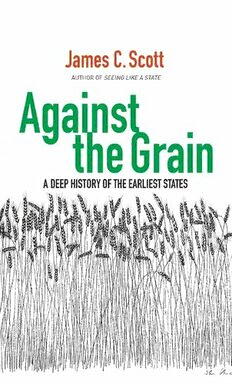
Against the Grain PDF
Preview Against the Grain
Against the Grain 1AMES C. SCOTT Yale UNIVERSITY PRESS New Haven and London Published with assistance from the foundation established in memory of Amasa Stone Mather of the Class of 1907, Yale College. Copyright 2017 by Yale University. «:> All rights reserved. This book may not be reproduced, in whole or in part, including illustrations, in any form (beyond that copying permitted by Sections 107 and 108 of the U.S. Copyright Law and except by reviewers for the public press}, without written permission from the publishers. Yale University Press books may be purchased in quantity for educational, business, or promotional use. For information, please e-mail [email protected] (U.S. office) or [email protected] (U.K. office). Set in Janson and Monotype Van Dijck types by Tseng Information Systems, Inc. Printed in the United States of America. Library of Congress Control Number: 2016960155 978-0-300-18291-0 (hardcover : alk. paper) ISBN A catalogue record for this book is available from the British Library. This paper meets the requirements of / z39.48-1992 ANs1 N1so (Permanence of Paper). 9 8 7 6 5 4 2 IO J l For my grandkids headed deeper into the Anthropocene Lillian Louise Graeme Orwell Anya Juliet Ezra David Winifred Daisy Claude Levi-Strauss wrote thus: Writing appears to he necessary for the centralized, stratified state to reproduce itself. . . .W riting is a strange thing . . . . T he one phenomenon which has invariably accompanied it is the formation of cities and empires: the integration into a political system, that is to say, of a considerable number of individuals . . . i nto a hierarchy of castes and classes . . . . I t seems to favor rather the exploitation than the enlightenment of mankind. Contents Preface lX INTRODUCTION. A Narrative in Tatters: What I Didn't Know NE. The Domestication of Fire, Plants, o Animals, and . . .U s 37 TWO. Landscaping the World: The Domus Complex 68 THREE. Zoonoses: A Perfect Epidemiological Storm 93 FOUR. Agro-ecology of the Early State n6 FIVE. Population Control: Bondage and War 150 SIX. Fragility of the Early State: Collapse as Disassembly 183 SEVEN. The Golden Age of the Barbarians 219 Notes 257 Bibliography 279
